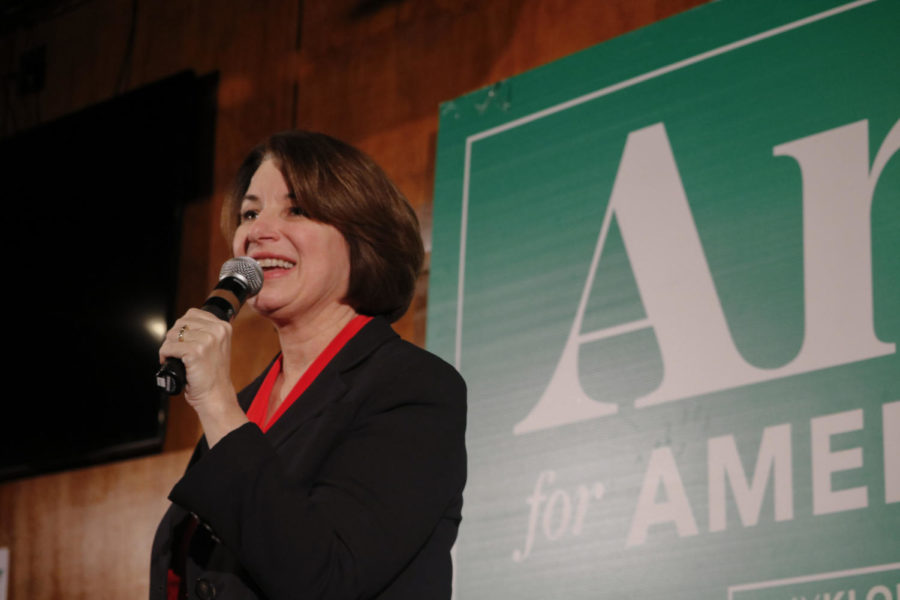Klobuchar passes Warren post-Iowa caucuses while electability concern lingers
February 16, 2020
The concern of whether a woman can win the presidency has lingered throughout the Democratic primary season.
In the New Hampshire primary Sen. Amy Klobuchar placed third, at 19.8 percent of votes and six delegates, while Sen. Elizabeth Warren came in fourth with 9.2 percent of votes and zero delegates.
New Hampshire was almost a flip from the results of the Iowa caucuses, where Warren placed third and Klobuchar a distant fifth.
After the New Hampshire primary, Warren began her post primary speech by congratulating Klobuchar for defying the polls.
“Right now it is clear that Sen. [Bernie] Sanders and Mayor [Pete] Buttigieg had strong nights, and I also want to congratulate my friend and colleague Amy Klobuchar for showing just how wrong the pundits can be when they count a woman out,” Warren said to supporters after the primary.
Although it is still early in the election process, Kelly Winfrey, assistant professor of journalism, said she questions whether a woman candidate can fit into the election.
“Right now it seems like there is no room for any female candidates,” Winfrey said. “After both Iowa and New Hampshire, you know despite Klobuchar having that surge in New Hampshire, a lot of the focus has been on Sanders, Buttigieg and Bloomberg. While Klobuchar got some coverage from New Hampshire she kind of faded from the news quickly and it went back to the discussion of three B’s: Bernie, Buttigieg and Bloomberg.”
The Klobuchar and Warren campaigns did not respond to emailed requests for comment by deadline.
Former Mayor Mike Bloomberg, a billionaire, joined the race in early November 2019.
Zack Bonner, lecturer of political science, said he believes Bloomberg has not faced the same criticism other candidates have due to his late entry.
“He is an interesting case because of the amount of money he has been spending, and the amount of money he has left to spend,” Bonner said. “He has also not received the same level of scrutiny that most of the other candidates [have] since he has not taken part in any of the debates and he really wasn’t anywhere in Iowa or New Hampshire. It has already started to happen a little bit with some of his former policies like ‘stop-and-frisk.’ I think once the American people start knowing a little bit more about him they are going to look into his past, and I don’t know if he will stay at the level he is currently at.”
According to the RealClearPolitics polling average of likely Democratic primary voters, Bloomberg has surged nationally to 14.2 percent support as of Sunday, putting him above Warren and Klobuchar.
“The Bloomberg [surge] frustrates me because it does show that a rich white man can just jump in and spend a lot of money and be competitive when there are other candidates that don’t have the positions of privilege that have worked very hard and have a lot of good experience,” Winfrey said. “Some of them have dropped out of the race altogether now, and they don’t get the same attention largely because they don’t have that privilege.”
Bonner said it is still too early in the election season to determine who will be the Democratic nominee, and the public will have a better understanding of who the candidate will be as more diverse states vote.
“Even in terms of Klobuchar’s momentum right now, if you look at national polling she has zero percent support from African Americans, which is going to be a huge issue in both South Carolina and Nevada,” Bonner said. “She might struggle a little bit as well because she has never had the same scrutiny level as other frontrunners because she has always hovered in that second tier of candidates.”
Bonner said just as sexism has played a role in this election, Democrats main concern is electability.
“Sexism plays a huge role in politics in general, but I would say for this election it is not necessarily looking for one woman in general it is more looking for the idea of electability,” Bonner said. “It seems like Democrats this time around are more looking towards beating Donald Trump opposed to pure ideology or policy issues.”
Winfrey said she believes voters are scared that a woman couldn’t beat Trump.
“I thought going into the primary and caucus season, that woman [countering Trump] could be something that voters would like,” Winfrey said. “Though it seems more and more that Democratic voters are scared and they are looking for what they think is the safest option is to beat Trump even if they don’t like them very much. I hear a lot of ‘[vote] blue no matter who’ and it kind of leads the conversation away from candidates that might be perceived as risky, like women, to candidates that might be seen as more safe like a more moderate, particularly male candidate.”
Winfrey said it is common for people to associate masculine traits with traits that make a candidate electable.

















